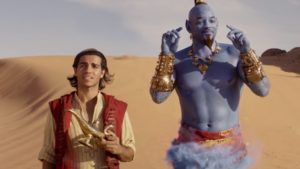The live-action version of ALADDIN does many things, including blurring the line between animation and live-action, not unlike the once and future AVATAR. It is more animation than live action and perhaps at some point there should be specific designation for cinematic efforts of this kind.
But I digress.
Most of what makes the film appealing is due to that extensive, and truly magical, CGI that makes Will Smith a semi-vaporous genie, and Abu, Aladdin’s monkey pal, a subtle creature as well as the comic relief. As for the rest, one ponders why a film that has committed so much money and effort to creating those effects then decided to skimp on everything else. One further ponders why Disney tasked Guy Ritchie, a director known for his innovative way around the gritty action flick, with directing a musical aimed squarely at the kiddie market.

Naomi Scott, Mena Massoud
Ritchie is credited as the co-writer of the new screenplay, too, and it’s one that has none of his caustic wit as it seeks to correct the politically incorrect gaffes of the original while inserting some modern-day political consciousness. This Aladdin (Mena Massoud) is still the savvy, street-smart petty thief of the original, the kind so near and dear to Ritchie’s heart, but he’s also the kind of guy who is bad at haggling and a softie when it comes to those less fortunate than he is. This Princess Jasmine (Naomi Scott) has aspirations beyond the traditional Disney-esque happily-ever-after. This is a people’s princess, which is how she and Aladdin meet cute when he saves her from the consequences of giving into her noble instincts while visiting the souk incognito. He’s handsome, resourceful, and rife with derring-do. She’s beautiful and a warrioress for social justice. Of course they fall in love, have the standard misunderstanding, and then are thrown together by fate and the machinations of Jafar (Marwan Kenzari), the kingdom’s evil Grand Vizier who has plans far, far above his station.

Massoud, Will Smith
Enter the Genie (Will Smith), the key to Jafar’s schemes and the ticket to Aladdin’s happiness. Secreted away in the Cave of Wonders, which can only be entered by a diamond in the rough, he’s the secret that Aladdin stumbles upon when Jafar’s treachery bites him in the nether regions. Innocently rubbing the lamp in which the Genie resides, he frees the cosmic being from his thousand-year imprisonment, and soon Aladdin has three wishes, a magic carpet, and a chance to win Jasmine for himself.
The film makes an interesting correspondence between the four main characters’ desire to change the role that society and fate have decreed for them, but stops short of making it the potent element that would have elevated the effort. It’s not until Scott belts out the reprise of the feminist anthem Speechless (a new song for this version) with welcome passion that the film comes close to fulfilling its promise.
Massoud has the safe brashness of a classic teen heartthrob, complete with the animated Aladdin’s trademark raffish lock of hair falling into his eyes. He’s a good foil for Smith, who deserves kudos for stepping into the part that Robin Williams patented, and for coming away not just unscathed, but actually triumphant. This is a genie suitably as buoyant as the dust devils that inspired the original legends of the djinn. Often working only from the waist up (the lower half an glittery, whirling visual effect), he slips from character-within-character as Williams did, with almost as much verve, albeit with fewer transitions, and a hint of the melancholy that being a slave to the lamp has engendered in his sky-blue breast. He’s also irresistible in mortal guise clumsily courting Jasmine’s handmaid, Dahlia (Nasim Pedrad).
The effects are uniformly dazzling, from imbuing that magic carpet with a palpable puppy-dog of a personality, to transforming a monkey into an elephant in explosive stages, to the gorgeous landscapes bathed in Mucha-esque pastels. But then the thud as we return to those few scenes that are strictly live-action and encounter the equally palpable chintziness. Crowds of dozens, instead of using CGI to generate imposing masses to inhabit the mythical kingdom. Costumes that are shiny and sparkly, yet distinctly less than luxurious for all the passementerie and baubles. Maybe it was the lighting exacerbated by the curious lack of energy that permeates everything except the action sequences, including Aladdin’s proto-parkour, where Ritchie’s signature stylized visuals shake things up, but are as jarringly out of place as if we were in a different film altogether.
ALADDIN gets credit for not whitewashing its cast, and it will charm the kids at whom Disney has taken aim. Those songs might even inspire nostalgia in the parents who first heard them as kids themselves. It’s a middling effort that doesn’t sully the original, but doesn’t quite justify remaking it for anything other than the money to be made from the next generation.
Your Thoughts?